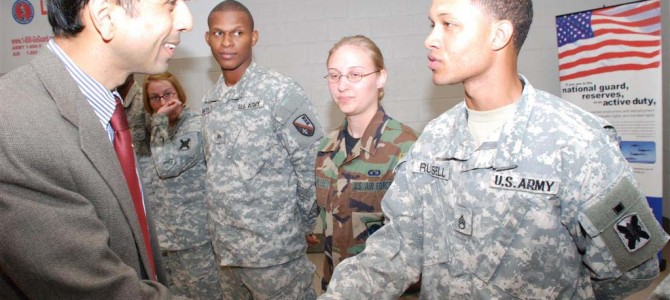Yes, the demise of the conservative hawk has been greatly exaggerated. If you don’t believe it, check out the saber-rattling arms race between Louisiana Governor Bobby Jindal and Florida Senator Marco Rubio.
Jindal, who says he’s been “thinking and praying” about a presidential run in 2016, came to Washington this week sounding more like someone pondering a 2004 candidacy. The man who once warned Republicans they must be the party of new ideas, wasn’t here to talk about his own education or welfare reforms – or any of the populist ideas he’s taken up as governor. Prospective presidential candidates must play rock-ribbed hawk. So that’s what he did.
And as much as I believe we need a robust military to annihilate evildoers every now and then, I can’t help but find three aspects of Jindal’s alarmist intimations ludicrous: 1. the idea that cutting any military spending puts the nation in instant mortal danger. 2. the notion that the world is buzzing with new existential threats, more dangerous than any we’ve known. 3. the belief that we can’t handle contemporary threats because of a lack of funding. We should be skeptical that any of those assertions are true.
“Peace through strength costs infinitely less in American blood and treasure than does war precipitated by weakness. We must be willing to pay the price for peace,” Jindal explained in a speech at the American Enterprise Institute this week. How much does peace cost? Jindal argues that the United States should spend at least 4 percent of its gross domestic product on the military. Well, we’re pretty close to that number already. But if we take all the concerns in Jindal’s corresponding policy paper seriously – as threats to the United States are evidently “growing everywhere” – we’d probably have to double that estimate.
Right now we spend around $632 billion on defense – not counting foreign aid inducements or veteran benefits – and that’s more than the combined expenditures of China, Russia, England, India, Brazil and, basically, anyone else who matters. So Jindal echoes many risible talking points made by Lindsey Graham and others recently, namely that we have cut “down to the smallest Army since 1940, the smallest Navy since 1915.” As if three rowboats should be measured against three aircraft carriers or a massive drafted army during World War II is comparable to the technological force we need today.
Are we really hampered in our fight ISIS or anyone else due to cutbacks? The fact is, American taxpayers are on the hook for 37 percent of the world’s military expenditures. Since we shoulder more responsibility, the cost is commensurate with our obligations. Whether that’s a good thing is another debate. But if conservatives continue to argue that massive government-run bureaucracies are debilitated by incompetence, waste, graft and corruption, surely they can’t believe the military is immune. Is there really no reform that might recoup the slight budget cuts that have hit military spending? No superfluous weapons program that might be nixed? No waste? In 2011, Secretary of Defense Robert Gates called the Pentagon’s spending infrastructure “an amalgam of fiefdoms without centralized mechanisms to allocate resources, track expenditures, and measure results.” He went on to say that he learned it “was nearly impossible to get accurate information and answers to questions such as ‘How much money did you spend’ and ‘How many people do you have?’” We won’t see an audit of military spending until 2017. How could we possibly know where we stand?
Jindal has often argues that we can’t fix education or poverty or health care by simply throwing money at the problem. Apparently defense is exempt from fiscal conservatism. He points out that in 2009 the government spent $830 billion — not including debt service costs — on a reckless stimulus bill. And in 2010, Washington passed Obamacare, which by 2024 will cost $235 billion per year in coverage expansions. If we can afford these sort of programs, why can’t we afford to protect the nation’s security, Jindal asks. Well, we can. But politically speaking, if Obama is a hypocrite for expanding a welfare state we can’t afford while cutting military funding, then hawks might consider the political implications of advocating for cuts in food stamps and Medicaid as they plow another trillion dollars into military spending over the next decade.
A conservative running for president might gain a lot of credibility by attempting to control costs across the board.
With all that’s going on, it might seem strange to argue that we live in a far less dangerous world today than we have at almost any time in human history. Certainly there are numerous situations that deserve our attention, threats that we may have to meet with Tomahawk Missiles and Stealth F-22 Raptors. But does the United States face more daunting threats to its existence today than it did 30 or 40 years ago? Even Jindal’s paper can’t come up with any new dangers, it only assumes that the situations we’ve been facing for years will be getting worse. If that’s true, perhaps we need more competent leadership. Maybe we need more focus. Maybe we need to pick our fights with a little more care. Maybe we need a few fresh ideas.
Follow David Harsanyi on Twitter.









